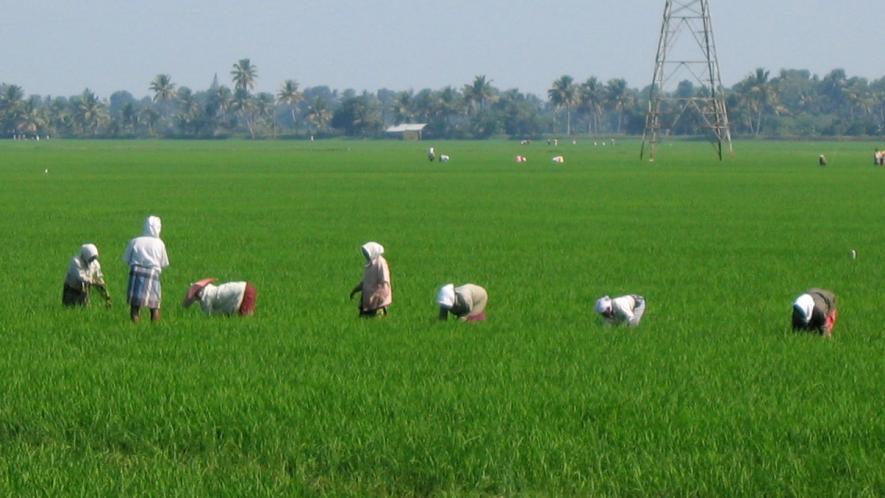‘Distress Sale’: Delayed Procurement Forces Farmers to Sell Paddy at Lower Price

Representational image. | Image Courtesy: Wikimedia Commons
Patna: Ramanand Singh, a marginal farmer, sitting outside his brick-house under the cloudy sky of mid-March, feels cheated by the government’s much-hyped claim that farmers will benefit from paddy procurement. Harendar was forced to sell his paddy at throwaway prices to local traders last month.
Singh, resident of a village under Naubatpur block, about 25 km from Patna, expressed dismay over the government’s apathy in ensuring paddy procurement on time and blamed nexus of the government officials, middlemen and traders for slow procurement.
Singh told NewsClick that this is not the first time when the procurement has been delayed. “It has been going on for past five to six years; government agencies have failed to procure paddy from farmers including rich, marginal and small-scale. This forces them to sell paddy to traders at much lower rates.”
According to him, even though the state government had announced a rate of Rs 1,815 per quintal as the MSP for paddy this time, farmers have been forced to sell it at the cost of Rs 1350 to 1400 per quintal.
Shankar Yadav, resident of a village under Bihta block on the outskirts of Patna, echoes Singh’s sentiment. “The government has completely failed to procure paddy directly from the farmers. Paddy procurement is not only slow, it has led to a distress sale by farmers,” he said.
Yadav and Singh are just two of the thousands of farmers—including rich and poor—who have been affected by the poor paddy procurement by the government agencies. They are worried and unhappy. “Farmers have been treated like fools. Look how the government has forced us to go for distress sale of paddy, which we had produced after hard labour of months. Poor farmers cannot wait for months to sell paddy if the government agencies delay procurement. They have to earn money for their necessities,” said Chandra Dev Prasad, a small farmer from a village under Vikram block in Patna.
Yadav said that even as the farmers are forced to sell paddy for a lower price, the traders pay them immediately. “And unlike government agencies, they don’t require any paperwork.”
The ground reality is not in tandem with the state government’s claim—of helping farmers to increase their income—and the central government’s announcement of taking measures to double the farmers’ income by 2022.
So far [as of March 13], as per the official data, the government has procured 10.78 lakh metric tonnes of paddy, amounting to just about 33% of its target.
The paddy procurement process started in the state on November 15 and the government aimed at procuring 30 lakh metric tonnes of paddy by March 31. With hardly 16 days left, it is unlikely for the government to reach its target.
Sambhu Sen Kumar, nodal officer for paddy procurement in the state cooperative department, admitted that paddy procurement was slow in December and January. “But it gained speed later. We are still hopeful of achieving the fixed target,” he said.
However, even last year, the government agencies had procured 14.16 lakh metric tonnes of paddy from 2.10 lakh farmers against the target of 30 lakh metric tonnes during 2018-19.
Paddy procurement was 11.84 lakh metric tonnes during 2017-18 against the target of 30 lakh metric tonnes. It was 18.42 lakh metric tonnes during 2016-17,18.23 lakh metric tonnes during 2015-16 and 19.01 lakh metric tonnes during 2014-15.
In Bihar, Primary Agriculture Cooperative Societies (PACS) and Vyapar Mandals have been engaged in procuring paddy directly from the farmers in each panchayat across the state to ensure that farmers get fair and remunerative prices for their crops.
On the other hand, changing rainfall pattern has also affected farmers in the state. Farmers could not plant the kharif paddy on nearly 0.4 million hectares due to one of the worst rainfall deficits last year. Poor rainfall forced farmers to cultivate paddy in 2.8 million hectares, against the target of over 3.2 million hectares.
Get the latest reports & analysis with people's perspective on Protests, movements & deep analytical videos, discussions of the current affairs in your Telegram app. Subscribe to NewsClick's Telegram channel & get Real-Time updates on stories, as they get published on our website.
























